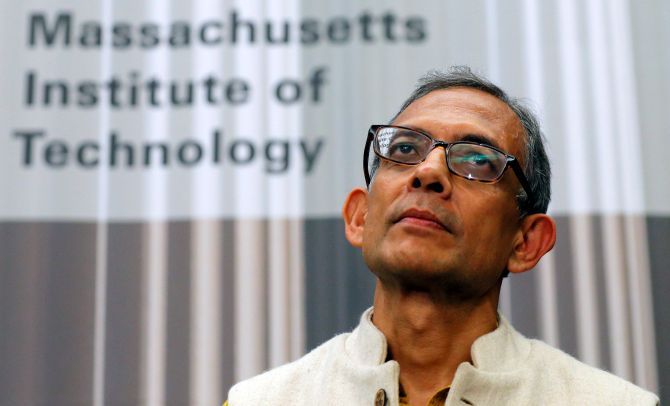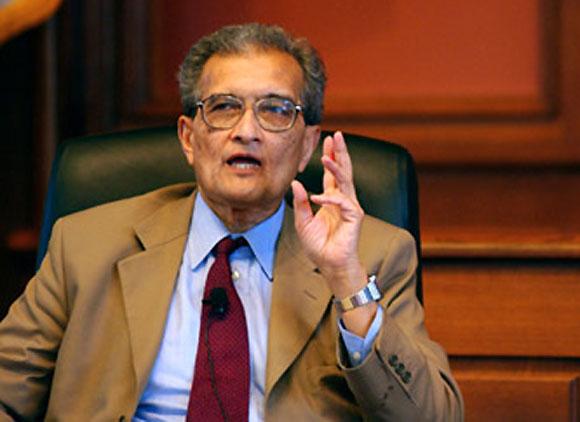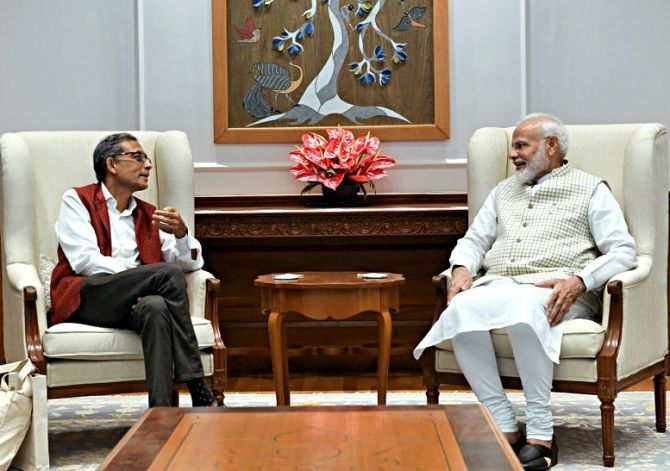Does Abhijit Banerjee's Nobel Prize help India reduce extreme poverty, asks Rajeev Srinivasan.

When Amartya Sen won the Sverige Riksbank Prize in Economics, loosely known as the Nobel Prize in Economics, in 1998, it was considered a landmark and a matter of great pride for India, for a variety of reasons. The man had been built up as an intellectual colossus, and the prize was thought merely his due.
India went ahead and hastily awarded him the Bharat Ratna in the very next year. Besides, his 'Kerala Model' was said to explain why Kerala has such a good Human Development Index despite its low per capita income.
I was one of the few people then, sort of like the boy who saw through the Emperor's New Clothes, who questioned whether there was less than meets the eye.
I believed that the free trade theorist Jagdish Bhagwati had far more claim to a Nobel, if indeed an 'Indian quota' existed and had been exercised for Sen's sake.
I also got cognitive dissonance about the fact that Sen had married into the Rothschild family: A very rich man talking about poverty.
Most of all, I believed, as a native son, that the 'Kerala model' was nothing more mysterious than a 'money-order economy'.

Fast forward to Abhijit Banerjee's 2019 Prize in economics. The accolades are more muted. I'm not sure why.
Perhaps it's because you can fool all the people some of the time, but not all the time.
As the famous cigarette ad says, 'You've come a long way, baby!' India has indeed come a long way from 1998 and Sen's prize.
The data shows that India has succeeded in reducing absolute poverty.
Here is the damning evidence: Brookings and the Poverty Clock report that India has, at last, escaped being the hell-hole with the largest absolute number of the poor in the world, and is on track to reduce it still further.
This, of course, has huge consequences: It is why Westerners are now sniffing around India (the latest being Henry Kissinger himself), possibly setting themselves up as middlemen for companies who wish to tap into the increasing consumer market as people begin to have disposable income, as happened in China.
It is evident that this is not thanks to the nostrums suggested by Abhijit Banerjee and his colleagues, all proteges of Sen.
That fact would have not been so blindingly obvious if Banerjee had not been the poster boy behind the NYAY scheme proposed by the Indian National Congress as the flagship economic program riding which it would win the 2019 elections.
NYAY proposed to give 70,000 rupees a year to the poorest 20% of the population, a version of the untested Universal Basic Income idea.
Alas, NYAY was exposed as a sham, because a. it is impossible to implement fairly in a corrupt country; b. the bottom 20% would then be better off than the next higher group, so finally the dole has to go to 50-60% through a recursive process; c. it is impossible to fund; d. it fails the 'smell test'.
Then, Banerjee appeared on TV supporting NYAY and even saying that 'India has too little inflation'. Today he's furiously backpedaling away from this fiasco, blaming the Nehru dynasty scion.
The 'inflation tax' meme he mentioned is key: that's exactly what the Congress had done for 70 years in order to suck vitality and capital out of the country.
Inflation tax means the value of your financial assets is subtly, imperceptibly and rapidly deprecated, and the currency, concomitantly, is debased.
This is exactly what has happened in India. The purchasing power of the rupee has plummeted. What my parents paid Rs 1,000 for, I estimate, will now cost me Rs 100,000.
Take real estate as an example. And the rupee, which was at $1=4 rupees in 1947, plunged to $1=70 rupees in 2013, a 94% loss in the exchange rate.
This is a perfect scenario to transfer wealth from savers to borrowers, including the government.
In a way, it mirrors the government printing lots of increasingly worthless rupees. As far as the privileged borrowers are concerned, it means the real value of their debt diminishes.
This is on top of crony capitalists such as Nirav Modi, Vijay Mallya et al just outright stealing money: Even if they actually repay, it is in such heavily inflated rupees that it is essentially daylight robbery.
So I got to thinking of Banerjee as 'InflationTaxBanerjee', perhaps an accessory after the fact in grand larceny. This made Banerjee's prize seem a little less impressive.

Indeed, in the Indian way of respecting gray hair, I had been a little diffident about Sen, although I did deconstruct him in a piece in Firstpost in 2015 (external link), and also for good measure Romila Thapar, another good old ancien regime intellectual, recently in the Deccan Chronicle (external link).
However, I am a contemporary of Banerjee, and so I don't need to give him any consideration for his age.
Besides, a contemporary of his at JNU, Krishna9900, told me how Banerjee was just one of the standard issue SFI cadres there, gheraoing the VC and going to jail: The usual.
I studied a bit of development economics at Stanford in the late 1980s, and almost became one of the 'Lords of Poverty' by joining the World Bank in its Young Professional Programme (classmates of mine did, bless them), but Silicon Valley beckoned, so I went back to tech.
But in those days, there was absolutely nothing in the literature from Banerjee.
And thereafter, I had never heard of him until 2019 and the NYAY fiasco, I thought. But then, I found I had tweeted a review of his book in 2011, so I guess I must have read the review and been less than overwhelmed. But it's not my field, which by then had become strategy and innovation.
So when there was a lot of recent news about his work, I started reading up on what he had innovated on, and I believe it is just one thing: RCT, or Randomised Control(led) Trials, which he has used to produce experimental backing to his theories about what works for the poor.
There is a fundamental problem with the statistics-based RCTs, which has bedeviled the most prolific users of this technique: the pharma companies.
This may be what led Nassim Nicholas Taleb, one of the foremost public philosophers of our time, and an expert statistician, to tweet: 'In 2008 I held that something as absurd as the pseudo-Nobel in economics would end self-destructing. No point fighting it: It would collapse under the weight & monstrosity of the fraud. You can't fool people forever. 2019 did the job.'
The problem with RCTs is that you have no idea if you are 'controlling' for the right variables, or even if you are controlling for enough of them.
In pharma, drug trials are often blamed for only being run on whites, or men, or affluent people, or meat-eaters, or other narrow demographic segments, and then the results being broadly generalised to all people under all circumstances. This is a problem in physiology.
This gets worse in the behavioral sciences.
The MacArthur Genius award winner and Stanford biologist/primatologist Robert Sapolsky pointed out in his magnum opus Behave that human behaviour is predicated on unimaginably many things, including your genes and upbringing, yes, but also what you ate yesterday, the fact that you fought with your spouse last week, plus what your ancient pastoral ancestors did when confronted by a saber-tooth tiger, and so on.
It is virtually impossible to 'control' for all these parameters to get the kind of clean, theoretically justifiable result that would be unchallengeable.
In my personal opinion, you just cannot extrapolate wildly from the small-scale controlled trials that Banerjee and co have done.
Cultural factors, the faith you have in institutions, experiences with government programmes (I am reminded of the brilliant Cuban film Memories of Underdevelopment), levels of childhood nutrition and thus brain growth, the salaries paid to teachers, doctors etc, whether there is tort regulation in the country, how much its rulers have stolen recently, all these may matter.
The parameters are virtually endless, and therefore the chances that you will be able to control for all of them are virtually nil.
That may just explain why the biggest poverty reduction exercises in history happened in China which does not entertain economists of the MIT, Chicago and Harvard variety, and now in India when the Deep State favorite Congress are out of power.
In other words, I think the RCT-based work has almost zero predictive power. Its epitaph could well be a quote from Jagdish Bhagwati: 'India's tragedy is that it has brilliant economists'. I would modify that to say, people who think they are brilliant economists.
- You can read Rajeev Srinivasan's earlier columns here.









